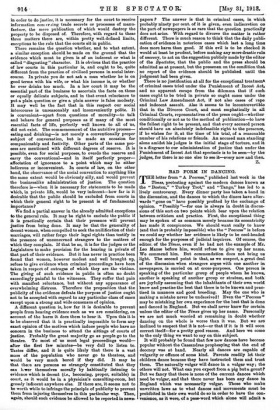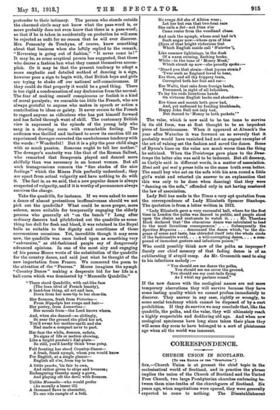BAD FORM IN DANCING.
THE letter from "A Peeress," published last week in the Times, protesting against the modern dances known as the "Boston," "Turkey Trot," and "Tango," has led to a lively controversy. Every dinner party has taken a hand in the discussion, and the dances to which the diners have after- wards " gone on" have possibly profited by the exchange of opinion. " Possibly "—for one is always in doubt in discus- sions of this sort on two points which bear upon the relation between criticism and practice. First, the exceptional thing may be spoken of as common merely because its eccentricity has made it conspicuous. We should want really to know (and that is probably impossible) who the " Peeress" is before we could say whether her evidence is likely to be cool-headed enough for the purposes of judicial inquirers. Of course, the editor, of the Times, even if be had not the example of Mr. Leo Maxse before him, would refuse to give up her name. We commend him. But commendation does not bring us light. The second point is that, as we suspect, a great deal of the discussion when strangers argue with one another in newspapers, is carried on at cross-purposes. One person is speaking of the particular group of people whom be knows, another is speaking of another group or stratum, and both are joyfully assuming that the inhabitants of their own world know and practise the best that there is to be known and prac- tised in manners and good breeding. May the one who is making a mistake never be undeceived! Even the "Peeress" may be mistaking her own experience for the best that is done and danced in England. But we shall never know for certain unless the editor of the Times gives up her name. Personally we are not much worried at remaining in doubt whether dancing on the whole is worse than it was. But we are inclined to suspect that it is not—or that if it is it will soon correct itself—for a pretty good reason. And here we come to the only thing we want to say on this subject.
It will probably be found that few new dances have become popular without the Cassandras prophesying that the end of decency was at hand. Nearly all dances are capable of vulgarity or offence of some kind. Parents readily let their children dance because they have instructed them and trust them. The naturally vulgar will dance in a vulgar way ; the others will not. What can you expect from a pig but a grunt ? But we fancy that there is none of the current dances which need be vulgar, and that there never has been any dance in England which was necessarily vulgar. Those who ma:ke unwritten laws as to what dances and movements must be prohibited in their own world do so in order to have the con- venience, as it were, of a pass-word which alone will admit a
pretender to their intimacy. The person who stands outside the charmed circle may not know what the pass-word is, or more probably does not even know that there is a pass-word; so that if he is taken in accidentally on probation he will soon be rejected as unfit for no reason that be will ever discover. Mrs. Ponsonby de Tomkyns, of course, knew something about that business when she loftily replied to the remark, "Reversing is going out of fashion," "It never came in It may be, as some sceptical person has suggested, that those who decree a fashion ban what they cannot themselves accom- plish. Or it may be that the present tendency to adopt a more emphatic and detailed method of dancing is a sign, however poor a sign to begin with, that British boys and girls are trying to shake off our national self-consciousness. If they could do that properly it would be a good thing. There is too rigid a condemnation of any declension from the normal. The fear of making oneself conspicuous or foolish is a kind of moral paralysis ; we resemble too little the French, who are always grateful to anyone who makes in speech or action a contribution to ideas or gaiety. It never occurs to the French to regard anyone as ridiculous who has put himself forward and has failed through want of skill. The customary British view is expressed in the episode of the young lady who sang in a drawing room with remarkable feeling. The audience was thrilled and inclined to avow its emotion till an experienced dowager corrected the unwholesome tendency with the words : " Wonderful I But it is a pity the poor child sings with so much passion. Someone ought to tell her mother."
The dowager's austerity was like that of the Roman Sallust, who remarked that Sempronia played and danced more skilfully than was necessary in an honest woman. But all such transgressions concern the " fine shades of the nice feelings" which the Misses Pole perfectly understood ; they are apart from actual vulgarity and have nothing to do with it. The fact is, as we said, that a new popular dance is always suspected of vulgarity, and if it is worthy of permanence always survives the charge.
Take the quadrille, for instance. If we were asked to name a dance of almost pretentious inoffensiveness should we not pick out the quadrille What could be more proper, more solemn, more suitable for temporarily engaging the elderly persons who generally sit " on the bench " ? Long after ordinary dancers had pitchforked out the quadrille as some- thing too dull for flesh and blood, it was retained in the Royal balls as suitable to the dignity and courtliness of those ceremonious occasions. Yet, incredible though it may seem now, the quadrille was once looked upon as something very "subversive," as old-fashioned people say of dangerously advanced opinions. In one of the most airy and engaging of his poems Moore wrote of the substitution of the quadrille for the country dance, and said just what he thought of the new importation from France. We commend the poem to the attention of the "Peeress." Moore imagines the nymph "Country Dance" making a desperate bid for her life in a ball-room which was dominated by "Mamselle Quadrille."
"There stood Quadrille, with cat-like face (The beau ideal of French beauty), A band-box thing, all art and lace,
Down from her nose-tip to her shoe-tie.
Her flounces, fresh from Victorine- From Hippolyte her rouge and hair— Her poetry, from Lamartine-
Her morals from—the Lord knows where.
And, when she danced—so slidingly, So near the ground she plied her art, You'd swear her mother-earth and she Had made a compact ne'er to part.
Her face the while, demure, sedate,
No signs of life or motion showing, Like a bright pendule's dial-plate- So still, you'd hardly think 'twos going.
Full fronting her stood Country-Dance-
A fresh, frank nymph, whom you would know
For English, at a single glance— English all o'er, from top to toe.
A little gauche, 'tis fair to own,
And rather given to skips and bounces; Endangering thereby many a gown, And playing oft the devil with flounces.
Unlike Afamsel/e—who would prefer (As morally a lesser ill)
A thousand flaws in character, To one vile rumple of a frill.
No rouge did she of Albion wear ;
Let her but run that two-heat race She calls a Set—not Dian e'er Came rosier from the woodland chase.
And such the nymph, whose soul had t
Such anger now—whose eyes of blue (Eyes of that bright victorious tint
Which English maids call' Waterloo'),
Like summer lightnings, in the dusk Of a warm evening, flashing broke, While—to the tune Of ' Money Musk,'
Which struck up now—she proudly spoke:— 'Heard you that strain—that joyous strain ?
'Twas such as England loved to hear, Ere thou, and all thy frippery train,
Corrupted both her foot and ear—
Ere Waltz, that rake from foreign lands, Presumed, in sight of all beholders, To lay his rude licentious hands
On virtuous English backs and shoulders—
Ere times and morals both grew bad, And, yet unfleeced by funding blockheads, Happy John Bull not only had.,
But danced to 'Money in both pockets."
The valse, which is now said to be too tame to survive in its old form, was at first thought to be an impudent piece of licentiousness. When it appeared at Almack's the year after Waterloo it was frowned on so severely that it
probably would have vanished had not an august exemplar of the art of valsing set the fashion and saved the dance. Some
of Byron's lines on the valse are much worse than the thing he satirized. When the Troistemps gave place to the Deux- temps the latter also was said to be indecent. But all decency. as Carlyle said in different words, is a matter of association.
Honi snit qui mal y pease tells us the same truth even better.
The small boy who sat on the sofa with his arm round a little girl's waist and retorted (in answer to an explanation that
this was only to be done when dancing) that they were "dancing on the sofa," offended only in not having mastered the law of association.
Lady Bell has made in the Times a very apt quotation from the correspondence of Lady Elizabeth Spencer Stanhope. The quotation is from a letter written in 1812.
"Lady Elizabeth gave a very successful ball, where for the first time in London the polka was danced in public, and people stood upon the chairs and rout-seats to watch it. . . . Mr. Theodore Hook declared that the obnoxious dance was calculated to lead to the most licentious consequences.' . . . Subsequently the Sporting Magazine . . . denounced the dance which, 'to the dis- grace of sense and taste, has obtruded itself into the whole circle of the fashionable world, . . . a will-corrupting dance, . . . a com- pound of immodest gesture and infectious poison.'" Who could possibly think now of the polka as improper? Surely our chief memory of that fading dance is of an exhilarating if stupid romp. As Mr. Grossmith used to sing to his infectious melody :— " You should see me dance the polka, You should see me cover the ground, You should see my coat-tails flying As I whirl my partner round."
If the new dances with the zoological names are not mere temporary aberrations they will survive because they have some lasting quality which we cannot profess immediately to discover. They answer in any case, rightly or wrongly, to some social tendency which cannot be disposed of by a curt prohibition. If they do survive we may conclude that, like the quadrille, the polka, and the valse, they will ultimately reach a highly respectable and doddering old age. And when new zoological specimens have long since taken their place they will some day seem to have belonged to a sort of pleistocene age when all the world was innocent.



















































 Previous page
Previous page